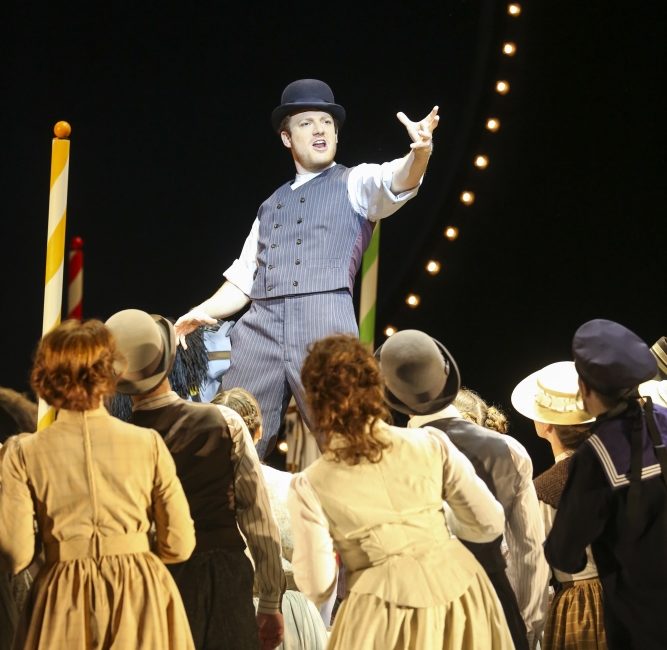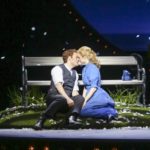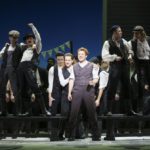 The ‘musical’, I would argue, is the American version of the European operetta: re-located to America with the Jazz-Age 1920’s, especially with ‘talking pictures’, transferring stage musicals to the silver screen. Talented musicians and songwriters from German-speaking lands were forced out with the rise of the Nazis, especially many Jewish. America, now the hub of popular music was were the action was. Thus Rodgers and Hammerstein’s Carousel – adapted from Ferenc Molnar’s Liliom– moved the plot from Budapest’s woods to America’s New England coast.
The ‘musical’, I would argue, is the American version of the European operetta: re-located to America with the Jazz-Age 1920’s, especially with ‘talking pictures’, transferring stage musicals to the silver screen. Talented musicians and songwriters from German-speaking lands were forced out with the rise of the Nazis, especially many Jewish. America, now the hub of popular music was were the action was. Thus Rodgers and Hammerstein’s Carousel – adapted from Ferenc Molnar’s Liliom– moved the plot from Budapest’s woods to America’s New England coast.
From their first collaboration, the triumphantly successful Oklahoma, Rodgers and Hammerstein raised the musical to a new level: ‘depicting serious dramatic conflict, elevating dance from mere entertainment to carrying the plot forward.’ The legendary Agnes de Mille choreographed Oklahoma, and Carousel (used in this Henry Mason Volksoper production.) As in Oklahoma , there’s a ‘seamless transition from spoken to sung text.’
So it’s fittingly ironic that Rodgers and Hammerstein’s hit of the 1940’s is being revived in Vienna, the home of operetta, with the hit songs sung mainly in German. Great music knows no barriers.
The Carousel Waltz blends the Overture into the opening scene, for maximum musical and dramatic impact, (Volksopera Orchestra conducted by Josef R. Olefirowicz.) Volksoper’s stage (Jan Mercer), dominated by a carousel, is like a circus, with jugglers, clowns, even a bearded lady on a plinth. Costumes are early 20th century , and the crier Billy Bigelow, (Daniel Schmutzhard) wearing pin-stripes and boater hat, catches the eye of Julie, the beautiful blonde Mara Mastalir in a long blue dress, a mill worker out with her friend Carrie.
In the plot the Carousel owner, the jealous Mrs Mullin, forbids Julie from taking another ride. Billy sides with Julie, derides Mullin, (Regula Rosin’s redhead in an emerald-green dress), and is fired. After all she’s done for him! The back story is important in Rodgers and Hammerstein, whose musicals are dramas with ‘social realism.’ Not just vehicles for hit songs, although there’s no shortage, with Carousel’s ‘You’ll Never Walk Alone’ (a hit for Frank Sinatra in 1946.)
The two gals are sitting, waiting for Billy, Carrie (Johanna Arrouas ) tells Julie about her engagement, and warns her, Mill owner Bascombe (Nicolaus Haag) won’t tolerate girls staying out late. They’re on a park bench; a lilac tree, an island of artificial lawn, in an expanse of bare boards. Not that glamorous, but there are some spectacular sets in the second half.
Barsombe strolls past with a uniformed cop, warns Julie about Billy- who’s been in prison, for robbery- and offers to take her home. She’s stubborn, decides to stay, and , like Billy, is fired.
They’re alone, talking about life, not quite admitting they’re falling in love. In their duet, the evergreen ‘If I loved you’ (sung in German, remember), they’re a natural together. Schmutzhard’s baritone has an impressively deep timbre. She, Mastalir, has a certain naive charm about her: but can she sing? Here, only an average soprano ; this isn’t high opera! But she compensates with magnetic stage presence, and has relatively few numbers. Schmutzhard, who dominates the show, now he has something- gloriously resonant, an authoritative presence. He’s a born ‘musical’ artist, and a lot more: (a Wagner Meistersänger in Bayreuth.)
She’s standing behind him as he extols her love for her. At last they look each other in the eyes and kiss. Passionately.
An all-American outdoor party – sung in German?- but Volksoper Chorus, and Youth and Children’s choruses, are quite something. Beyond the resources of any theatre. It seems that Julie and Billy have married, and moved in with Julie’s cousin Hettie (Atala Schöck), standing out in her emerald-green frock. Schöck, a hefty mezzo soprano, is superb, and brings distinction to the cast. There’s fabulous choreography (Francesc Abos) for the ensemble ‘June is busting out all over’, another R&H classic. Vienna State Ballet performers are breathtaking.
Also notable is Johann Arrouas as Carrie, bubbly, vivacious, a natural. She’s marrying the rather dour Enoch Snow (Jeffrey Treganza), hence the showstopper ‘When I marry Mr Snow’, and the infectiously catchy hit tune ‘When the children are asleep’. Carrie’s also being chased by the villainous Jigger (the cool Christian Graff), who, in a later scene, gets very physical, supposedly teaching her self-defense. Or so she tries to explain to the humourless Snow, who, unconvinced, looks on horrified.
Billy’s crewe- a male chorus in seamans outfits- they’re from a whaling ship- perform some stunning dance movements, using crates of beer for props.  This is a prelude for Jigger’s proposition ‘a Dirty Job’, planning to rob rich Bascombe. Or should he accept Mrs. Mullan’s – she’s offering him a stake in the carousel, and more, a ‘hands-on’ job.
This is a prelude for Jigger’s proposition ‘a Dirty Job’, planning to rob rich Bascombe. Or should he accept Mrs. Mullan’s – she’s offering him a stake in the carousel, and more, a ‘hands-on’ job.
Julie tells him she’s pregnant; his initial reaction is violent, pushing a table over. Then the realization sets in motion a fantasy sequence- the ‘Soliloquy’/aria (You’ve got to be a father to a girl). Billy imagines they’re having children: first, a teenage splitting-image of Billy, then a little girl walks on. (As in Oklahoma’s nightmare sequence, R and H were pushing the boundaries of musical theatre.)
Act 2 opens with the beach party after the ‘real nice clambake’ . They’re all crashed out on the beach- indicated by a few strategically placed rocks. And they gradually couple, bursting into the ‘clambake’ dance routine.
R and H cleverly counterbalance the festivities against the dark plot Jigger’s forcing Billy into. ‘We’re a team: You can do anything by force.’ Jigger’s attempted seduction of Carrie shows his ruthlessness. Christian Graf hardly sings, but his lank figure -long blond hair, wearing a black waistcoat – is well characterized. Snow dumps Carrie. The girls comfort her, but Julie sings- Billy in mind- He’s your fellow and you love him (‘What’s the use of wond’rin.’) Malastir is plaintive; she has charm and sensitivity. She’s sensing something is up, trying to stop the robbery.
The robbery heist -in a dockyard, on the look-out for a ship- is very well staged. The sharp realism is not what you’d expect for a musical: the violent attempted murder, the suspenseful aborted escape. Billy is eventually caught, held at gunpoint, but escapes to stab himself rather than face twenty years’ jail.
And the dying man is discovered by Julie, at first frigid with shock: all the more poignant as stragglers from the party walk by. Malastir begins to sing, then collapses over the corpse, and it’s Nettie, Schöck’s magnificent mezzo, who sings, with unadorned conviction, Billy’s epitaph: he was impatient and unlucky. The scene is high drama, there’s dead silence, as she sings
When you walk through a storm …
You’ll never walk alone.
And, just when you thought it’s over, an extended ‘epilogue.’ Bigelow, in purgatory, is reprieved for one day to visit his daughter, now 15. Any sentimentality is eschewed by the comic touches when Billy is taken to the ‘Starkeeper’.  Then, the appearance of a girl, blonde, in a red dress, Mila Schmidt as Louise Bigelow, who holds the stage in an extended ballet sequence: the loner standing out from the other ‘respectable’ children , who, (including her boyfriend), shun her because of her father. Billy visits Julie – there’s a reprise of If I loved you– and attends his daughter’s prize-giving. Then, the surprise, the Finale: the Chorus sing ‘You’ll never walk alone’ (in English) with such purity and simplicity, untainted, that I could hardly hold back my emotion.
Then, the appearance of a girl, blonde, in a red dress, Mila Schmidt as Louise Bigelow, who holds the stage in an extended ballet sequence: the loner standing out from the other ‘respectable’ children , who, (including her boyfriend), shun her because of her father. Billy visits Julie – there’s a reprise of If I loved you– and attends his daughter’s prize-giving. Then, the surprise, the Finale: the Chorus sing ‘You’ll never walk alone’ (in English) with such purity and simplicity, untainted, that I could hardly hold back my emotion.
Volksoper Orchestra – raised out of the ‘pit’ opening Act 2 – sounded luxuriantly Hollywood. Conductor Olefrowicz, young, bald, a big boy, was really enjoying himself. Of course this R and H masterpiece- rated by Time Magazine ‘Best Musical of the 20th Century’- should be performed in English. But if it has to be in German, then surely an (international) audience are entitled to English sub-titles. P.R. ©
Photos : Daniel Shmutzhard (Billy Bigelow); Mara Mastalir (Julie) and Daniel Schmutzhard (Billy); Daniel Schmutzhard and ensemble; Daniel Schmutzhard, Mila Schmidt (Louise Bigelow) and Vienna State Ballet
© Volksoper Wien/ Barbara Pálffy

The musical received almost unanimous rave reviews after its opening in 1945. According to Hischak, reviews were not as exuberant as for Oklahoma?
Woah! I’m really loving the template/theme of
this website. It’s simple, yet effective. A lot of times it’s
very difficult to get that “perfect balance” between user friendliness
and appearance. I must say that you’ve done a fantastic job with this.
Additionally, the blog loads extremely fast for me on Internet explorer.
Excellent Blog!
I was wondering if you ever thought of changing the page layout of your blog?
Its very well written; I love what youve got to say. But maybe
you could a little more in the way of content so people could connect with it
better. Youve got an awful lot of text for only having one or 2 images.
Maybe you could space it out better?
Great content! Super high-quality! Keep it up!